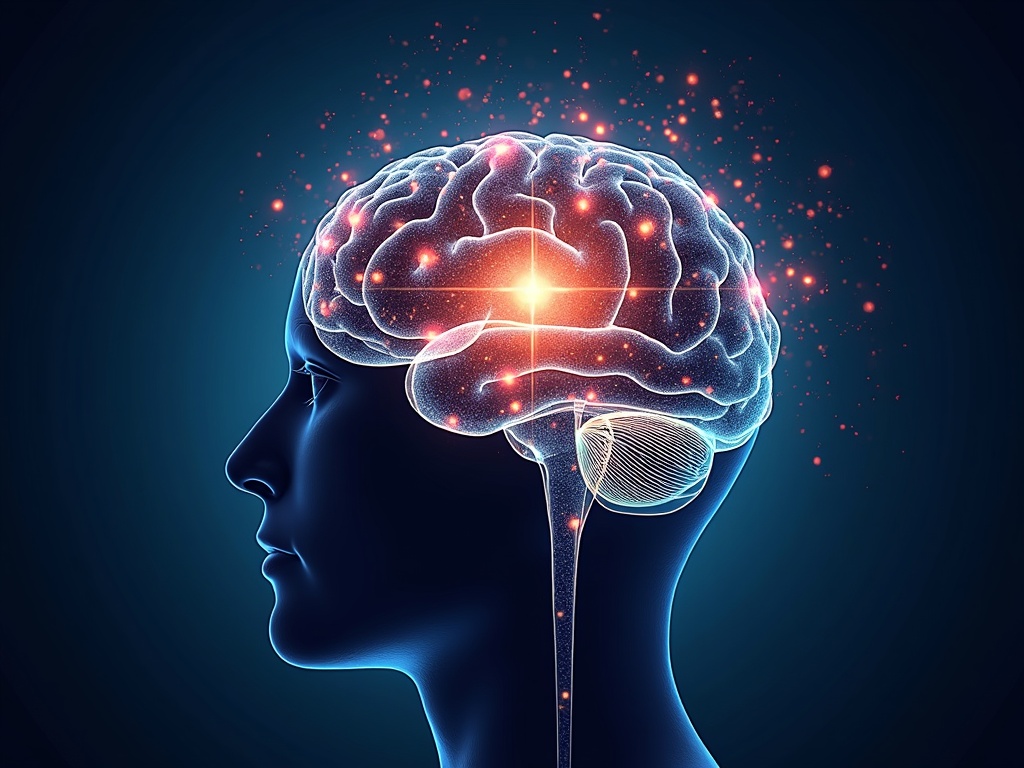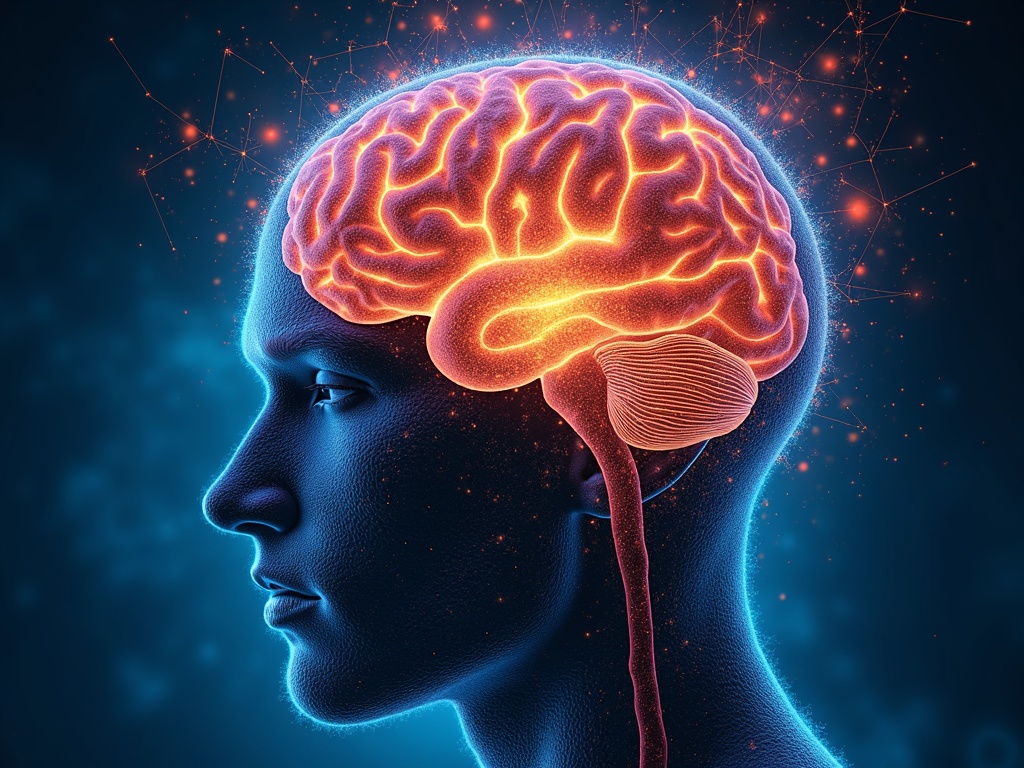How Stress Affects the Brain in Men: Understanding the Male Stress Response
Imagine this: a tiger is chasing you. Your heart hammers, your breath quickens, and your senses sharpen. This is the primal stress response, designed to keep you alive. But what happens when the tiger is replaced by a demanding boss, financial woes, or relationship problems and the chase never ends? For men, chronic stress can have profound and often overlooked impacts on the brain.
The Male Stress Response: A Biological Overview
Stress isn't just a feeling; it's a complex cascade of hormonal and neurological events. When a man perceives a threat, the hypothalamus, the brain's control center, kicks into gear. It activates the sympathetic nervous system, initiating the fight-or-flight response. Adrenaline floods the system, increasing heart rate and blood pressure. Simultaneously, the hypothalamus signals the adrenal glands to release cortisol, the primary stress hormone.
The Role of Testosterone
Testosterone, the dominant male sex hormone, plays a crucial role in the stress response. While acute stress can temporarily elevate testosterone, chronic stress often leads to a decline. This is because cortisol, in prolonged high doses, can interfere with testosterone production. This hormonal shift can have significant consequences for a man's mood, energy levels, and cognitive function.
The HPA Axis and its Disruption
The hypothalamic-pituitary-adrenal (HPA) axis is the body's central stress response system. Under normal circumstances, cortisol levels rise and then, through a negative feedback loop, signal the hypothalamus to shut down the stress response. However, with chronic stress, this feedback loop can become dysregulated. The HPA axis becomes overactive or underactive, leading to either consistently elevated or blunted cortisol levels, both of which are detrimental to brain health.
Specific Brain Regions Affected by Stress in Men
Stress doesn't affect the brain uniformly. Certain regions are particularly vulnerable, and understanding these specific impacts is key to mitigating the negative effects.
The Prefrontal Cortex: Executive Function Under Siege
The prefrontal cortex (PFC) is the brain's CEO, responsible for executive functions like planning, decision-making, working memory, and impulse control. Chronic stress impairs PFC function in men. Studies show that elevated cortisol levels shrink the PFC, leading to difficulties in concentration, impaired judgment, and increased impulsivity. This can manifest as poor performance at work, difficulty managing finances, or strained relationships due to rash decisions.
The Amygdala: Emotional Hijacking
The amygdala is the brain's emotional center, particularly involved in processing fear and anxiety. While the PFC is responsible for rational thought, the amygdala is responsible for our more base emotional responses. Stress increases activity and enhances connections in the amygdala, making men more reactive to perceived threats and prone to anxiety, irritability, and even aggression. This amygdala hijack can override rational thought, leading to impulsive and often regrettable behavior.
The Hippocampus: Memory and Spatial Navigation at Risk
The hippocampus is crucial for memory formation and spatial navigation. Chronic stress damages the hippocampus in men by suppressing the birth of new neurons and impairing its overall function. This can result in difficulty learning new things, forgetfulness, and problems with spatial orientation. Studies have linked chronic stress to a smaller hippocampus, increasing the risk of age-related cognitive decline and even dementia.
The Striatum: Habits and Impulsivity
The striatum plays a key role in habit formation and reward-seeking behavior. While not as directly impacted as the PFC, amygdala, and hippocampus, the striatum is nonetheless an important area to consider. Chronic stress can lead to heightened activity in the striatum in men, leading to the potential for harmful habit formations. For example, those experiencing immense stress at work might begin drinking every night as a coping mechanism, resulting in an alcohol dependency.
The Unique Challenges Men Face with Stress
While stress affects everyone, men often face unique challenges in dealing with it, many of which are rooted in societal expectations and gender norms.
The Stigma of Vulnerability
Traditional masculine ideals often discourage men from expressing vulnerability or seeking help for emotional problems. Many men are conditioned to believe that they should be strong, stoic, and self-reliant, making it difficult for them to acknowledge their stress and seek support. This internalized pressure can lead to suppressed emotions, unhealthy coping mechanisms, and a reluctance to seek professional help, exacerbating the negative effects of stress on the brain. This is why it's important to foster community spaces where men can feel safe opening up.
Coping Mechanisms: Not Always Helpful
Men and women tend to cope with stress differently. While women are more likely to seek social support, men often turn to solitary activities like watching TV, playing video games, or engaging in risky behaviors. While these activities may provide temporary relief, they often fail to address the underlying causes of stress and can even worsen the problem in the long run. For example, relying on alcohol or drugs to cope with stress can lead to addiction and further damage the brain.
Work-Related Stress: A Major Factor
Men are often socialized to prioritize their careers, and work-related stress is a major contributor to overall stress levels. Long hours, demanding workloads, job insecurity, and workplace conflicts can all take a toll on a man's mental and physical health. Furthermore, men in leadership positions may experience even greater stress due to the added responsibility of managing teams and making critical decisions.
Strategies for Managing Stress and Protecting the Male Brain
The good news is that the brain is remarkably resilient, and there are many effective strategies that men can use to manage stress and protect their brain health.
Prioritize Sleep Hygiene
Sleep is crucial for brain health and stress management. Aim for 7-9 hours of quality sleep each night. Establish a regular sleep schedule, create a relaxing bedtime routine, and optimize your sleep environment by making it dark, quiet, and cool.
Embrace Exercise
Exercise is a powerful stress reliever and brain booster. Engage in regular physical activity, such as running, swimming, weight training, or playing sports. Exercise releases endorphins, which have mood-boosting effects, and promotes the growth of new brain cells.
Mindfulness and Meditation
Mindfulness practices, such as meditation and deep breathing exercises, can help calm the mind and reduce stress. These techniques involve focusing on the present moment and observing your thoughts and feelings without judgment. Regular mindfulness practice can strengthen the connection between the prefrontal cortex and the amygdala, allowing you to better regulate your emotional responses.
Cultivate Social Connections
Strong social connections are essential for mental and emotional well-being. Make time for friends and family, join a club or organization, or volunteer in your community. Talking to others about your concerns can provide valuable support and perspective.
Seek Professional Help
If you are struggling to manage stress on your own, don't hesitate to seek professional help from a therapist or counselor. Therapy can provide you with coping skills, stress management techniques, and a safe space to explore your emotions. Cognitive behavioral therapy (CBT) is a particularly effective approach for managing stress and anxiety.
Dietary Considerations
A balanced diet rich in fruits, vegetables, and whole grains can help support brain health and resilience to stress. Avoid processed foods, sugary drinks, and excessive caffeine and alcohol. Consider incorporating foods that are known to reduce stress, such as fatty fish rich in omega-3 fatty acids, dark chocolate, and chamomile tea.
The Long-Term Implications of Unmanaged Stress in Men
Ignoring the impact of stress on the brain can have serious long-term consequences for men, increasing the risk of various mental and physical health problems.
Increased Risk of Mental Health Disorders
Chronic stress is a major risk factor for depression, anxiety disorders, and even post-traumatic stress disorder (PTSD). The constant activation of the stress response system can disrupt brain chemistry and impair emotional regulation, making men more vulnerable to these conditions.
Cognitive Decline and Dementia
As previously mentioned, prolonged exposure to stress hormones can damage the hippocampus and prefrontal cortex, accelerating cognitive decline and increasing the risk of Alzheimer's disease and other forms of dementia.
Cardiovascular Disease
Stress is also closely linked to cardiovascular disease. Chronic stress elevates blood pressure, increases inflammation, and promotes unhealthy habits, such as smoking and overeating, all of which contribute to heart disease and stroke.
Weakened Immune System
Chronic stress weakens the immune system, making men more susceptible to infections and illnesses. The stress hormone cortisol suppresses the activity of immune cells, reducing the body's ability to fight off pathogens.
Taking Control: Protecting Your Brain from Stress
Understanding how stress affects the brain in men is the first step toward taking control of your mental and physical well-being. By adopting proactive stress management strategies, cultivating healthy habits, and seeking support when needed, men can protect their brains from the damaging effects of chronic stress and live healthier, more fulfilling lives. The tiger may be gone, but the modern-day stressors require just as much attention and strategic action.

